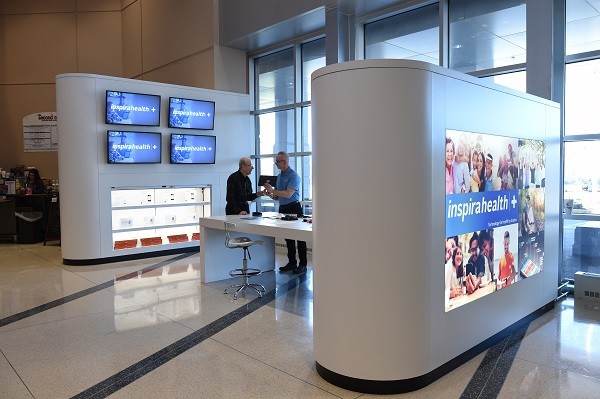In South Jersey, Inspira Brings Health Care Closer to Patents through Tech

[In October, we caught up with David Johnson VP, Inspira Innovation Center at Inspira Health Network, who told us about the tech innovations at that organization. Inspira Health Network is a charitable nonprofit healthcare organization serving communities across southern New Jersey. The network, which traces its roots to 1899, comprises three hospitals, a comprehensive cancer center, several multi-specialty health centers and a total of more than 100 locations.]
Last year was a big year for health care tech at Inspira (Vineland). That was the year that the healthcare network opened an innovation center and also began offering a technology kiosk where patients can access devices that can be set up to connect with health coach prescribed apps.
According to David Johnson, vice president of the Inspira Innovation Center, Inspira has always fostered innovation. “We definitely have always valued our employee and medical staff ideas. I’d say over the years – and I’ve been here 14 years – we’ve developed a lot of innovative programs and tactical solutions. Most of them filled internal gaps, but some had some real market potential. So, we realized that either way, we really needed to create a pathway for these ideas so they can go from concept to execution rapidly.”
The organization announced its innovation center in June, along with a $1 million fund that could be used as seed money for submissions from either its professional staff, medical staff or outside entities. For the staff, who would become innovation fellows, the money would give them the dedicated time to work on ideas and make sure they deliver a “wow experience” for patients.
The organization has received more than 20 submissions since it launched the innovation center. “Once we get the submissions, we do a cursory review to make sure it meets our criteria,” Johnson said. The idea has to bepatient focused, quality focused, create a wow experience or meet a need in the organization. If it meets the criteria, the idea is presented by its promoter to an innovation council, he added.
The innovation council itself is a fluid organization. If the idea submitted has a lot of clinical relevance, there will be increased physician representation. If it’s purely technical, then more people from the IT group will be on the council, Johnson said.
“The next level is custom, depending on what the idea is that they submit. It could be the founders need dedicated time. It could be they need space and resources. They could also need seed funding, or something else.”
Asked what kind of ideas the innovation center is seeing, Johnson replied that most ideas deal with internal efficiency and things that help patients access services better. They are also seeing ideas in the clinical realm that will have significant impact on patient care.
One of the ideas that came out of the innovation center was Health+, a kiosk servicing patients that looks like a technology service bar in a store. This idea came from Inspira’s management, as it was looking at ways the healthcare system could get more involved in wearable technologies.
Anyone can visit the genius bar locations, but it is aimed at patients, Johnson said. “We offer smart
technology. Right now we have five devices in these kiosks that are integrated with the MyInspira App which is available from the Apple App Store or Google Play. We offer a fitness tracker, a smart blood pressure cuff, a smart pulse oximeter, a smart tachometer and a smart scale.”
Patients are connected by three different clinical programs, he noted. A coaching program helps patients after they are discharged. For example, a patient being discharged after a congestive heart failure incident could be referred by a health coach to talk to one of the Health+ techs.
The patient brings a form with them that indicates that the patient needs a smart scale, because monitoring weight is important for that particular condition. Maybe the form will indicate the patient needs to weigh themselves three times a week, Johnson said.
“They’ll come down to the kiosk, and we’ll set them up with their smart scale and we’ll create all of their MY Health Actions in their MyInspira app. We’ll show them how to use it and then we’ll send them on their way.”
The health coaches will collect the data and use that information on follow-up calls to the patient to help the patient be more accountable for their health and wellness. “The objective is to keep them out of the emergency department and from being readmitted, to keep them as healthy as possible. And we can do that by selecting biometrics that are important to their disease state at home.”
The MyInspira app was developed entirely in-house, Johnson noted. Besides integrating with coach recommendations, the app also integrates with a Physician Referred Exercise Program and is used in the fitness centers. Health+ also supports population health departments; programs that help patients manage chronic illness such as congestive heart failure, chronic obstructive pulmonary disease and diabetes. Besides these more advanced usages, the app lets patients find out about ER wait times, access their patient portal, and do other tasks like pay their bill.
Johnson noted that the health care system wants to work with startups and others with great ideas for them. They can connect with Inspira at innovation@ihn.org.

